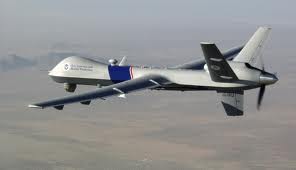People of good conscience should not vote for President Obama. So says columnist Conor Friedersdorf. In a piece in Atlantic magazine entitled, “Why I Refuse to Vote for Barak Obama,” Friedersdorf is unequivocal. “I don’t see how anyone who confronts Obama’s record with clear eyes can enthusiastically support him.”
Friedersdorf’s indignation stems from the president’s abuse of executive authority. He’s particularly outraged by armed drones that “terrorize innocent Pakistanis on an almost daily basis.” The administrations extrajudicial “kill lists,” or manifest of individuals targeted for assassination that it and it alone compiles, also horrors Friedersdorf, as does Obama’s reckless disregard of the War Powers Resolution requiring the executive to obtain approval from Congress before committing armed forces to sustained military action.
Should all of the above disqualify Obama?
Though the drone war began under Bush II, not Obama, the current president has expanded its scope dramatically. According to media reports compiled by the New America Foundation, more than 300 drone strikes have occurred during Obama’s single term, a tally outnumbering that of his two-term predecessor by a factor of five to one. The attacks may not even be that effective. CNN terrorism expert Peter Bergan notes that as few as one in seven of the unmanned assaults in Pakistan kill a militant leader: “In total, according to our analysis, less than two percent of those killed by US drone strikes in Pakistan have been described in reliable press accounts as leaders of al-Qaeda or allied groups.”
Like all weapons, drones cause “collateral damage,” though just how much is debatable. The Bureau of Investigative Journalism in England estimates that between 282 and 535 noncombatants, including 60 children, have died from drone strikes during Obama’s tenure. Whatever the actual number, drones disrupt life in the tribal areas of northwest Pakistan, where many of the pilotless aircraft strikes occur. Friedersdorf quotes one Pakistani woman’s heartbreaking reflections: “Because of the terror [generated by the overhead buzzing of the drones], we shut our eyes, hide under our scarves, put our hands over our ears.”
Fear of being mistakenly targeted by the aircraft may help explain why, according to the New America Foundation, almost nine in ten Pakistanis in that country’s northwest tribal region oppose the US’s counter-terrorism efforts. Many deeply resent the US as a result, which brings to mind a question once asked by Donald Rumsfeld: are we killing more extremists than we’re creating? Nobody knows.
As problematic, Obama personally oversees the selection of militants for targeting (oftentimes by drones), which includes Americans and minors. Jo Becker and Scott Shane of The New York Times chronicle the weekly “nominations” process conceived by the current administration where members of the intelligence community draft on weekly basis recommendations for the president’s consideration on who should be killed.
This process’ lack of transparency and oversight, its questionable legal basis, and absence of an explanation of how the administration defines “enemy combatants” are but a few of the serious concerns associated with Obama’s counter-terrorism policy. Justification for the “kill list” prompted Georgetown University legal scholar Rosa Brooks to remark to the Financial Times: “That amounts, in practice, to a claim that the executive branch has the unreviewable power to kill anyone, anywhere, at any time, based on secret criteria and secret information discussed in a secret process by largely anonymous sources.” Congress should provide legislative oversight to address these and other related matters, but it has shamefully shirked its responsibility.
Friedersdorf cites Obama’s refusal to adhere to the War Powers Resolution during the Libya campaign, though the law has been routinely ignored since its promulgation, but he neglects to mention a flagrant violation of civil liberties committed by the president, or broad use of warrantless wiretapping of American citizens, which, according to the ACLU, has quadrupled over the past four years.
This catalogue of threats to civil liberties and, indeed, to the rule of law itself, have mostly gone unquestioned by the same liberals who screamed “Bloody Murder!” when the same sorts of violations occurred during George W. Bush’s tenure. Glenn Greenwald of Salon and The Guardian, one of the few principled liberals who have condemned the Obama administration for its many abuses of power, correctly bemoans what he calls “repulsive progressive hypocrisy.” Yet should Obama’s record disqualify him from consideration at the ballot box, as Friedersdorf claims?
To believe so is to assume that a Romney administration would take a different tack on national security matters, which is unlikely, a point Friedersdorf concedes. To believe so also assumes that Romney would nominate judges more inclined to check the abuse of authority. This is also unlikely. Finally, to believe that Obama’s “imperial presidency” disqualifies him for reelection is to accept by default his opponent’s platform, including, for example, his (Romney’s) dogged determination to turn the country into a feudal-like state by relentlessly preferencing the rich and powerful.
Far better to vote for a highly-flawed Obama and congressional candidates who take seriously their responsibility as potential members of a co-equal branch of government to provide the checks and balances vital to sustaining our democracy.


Leave a Reply